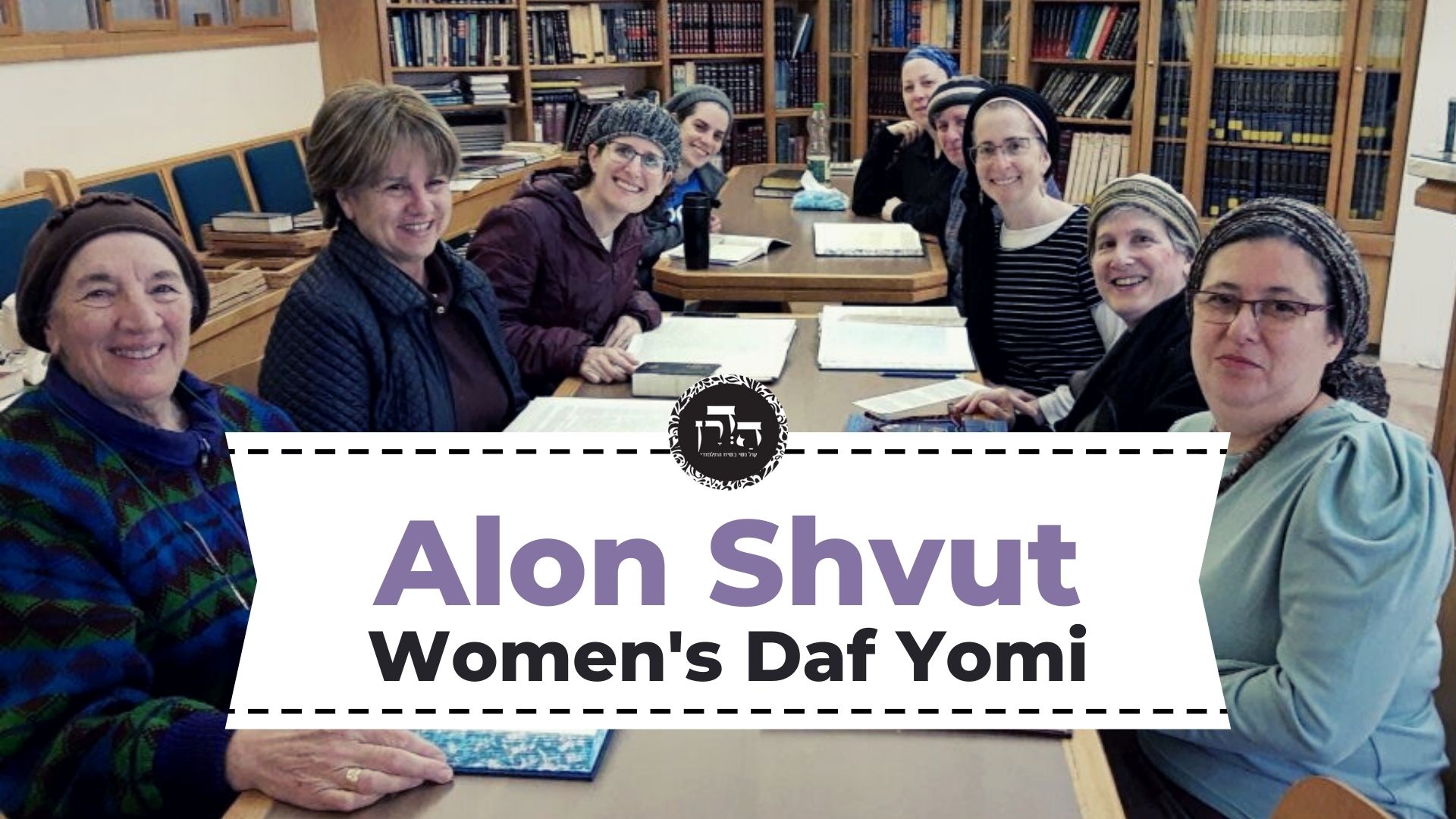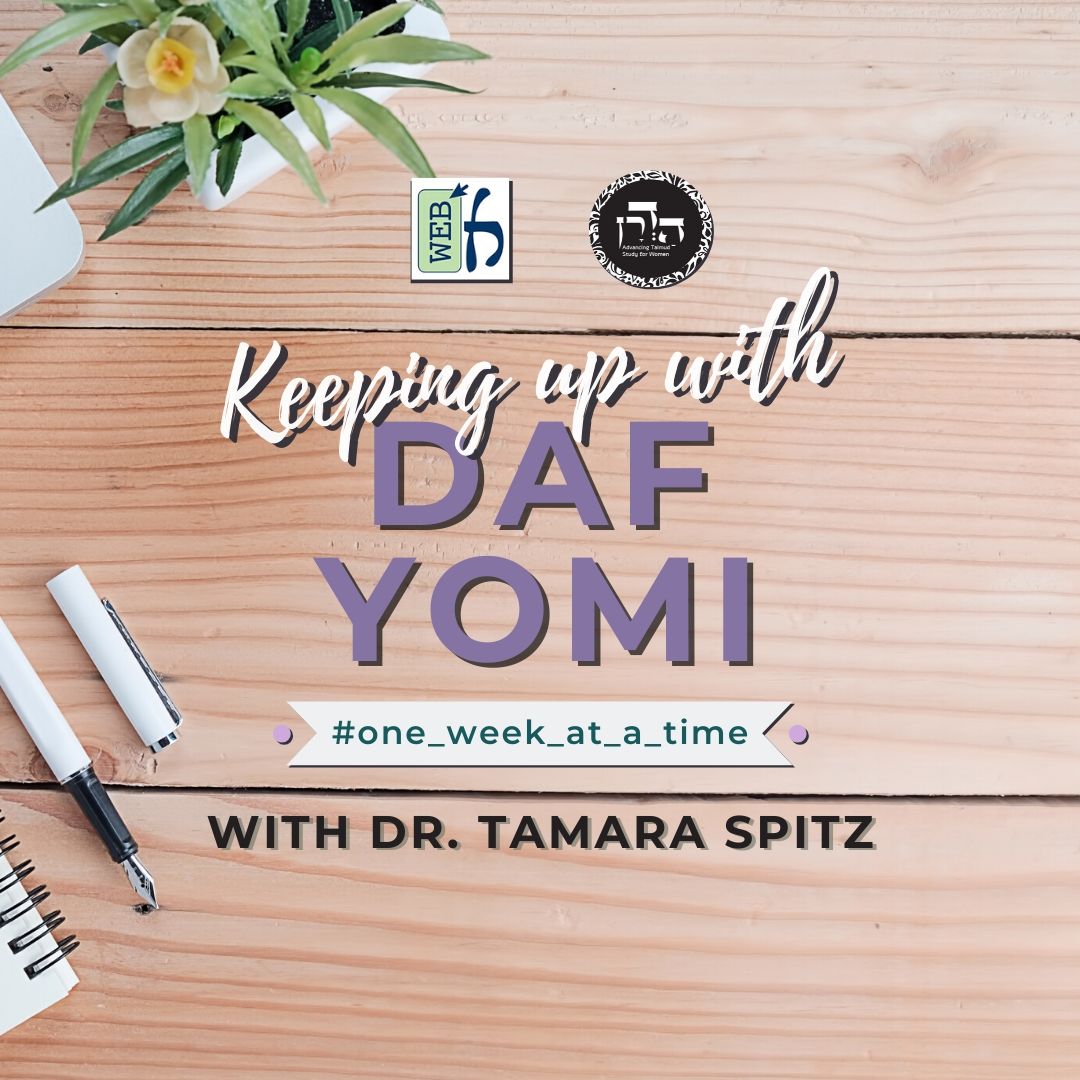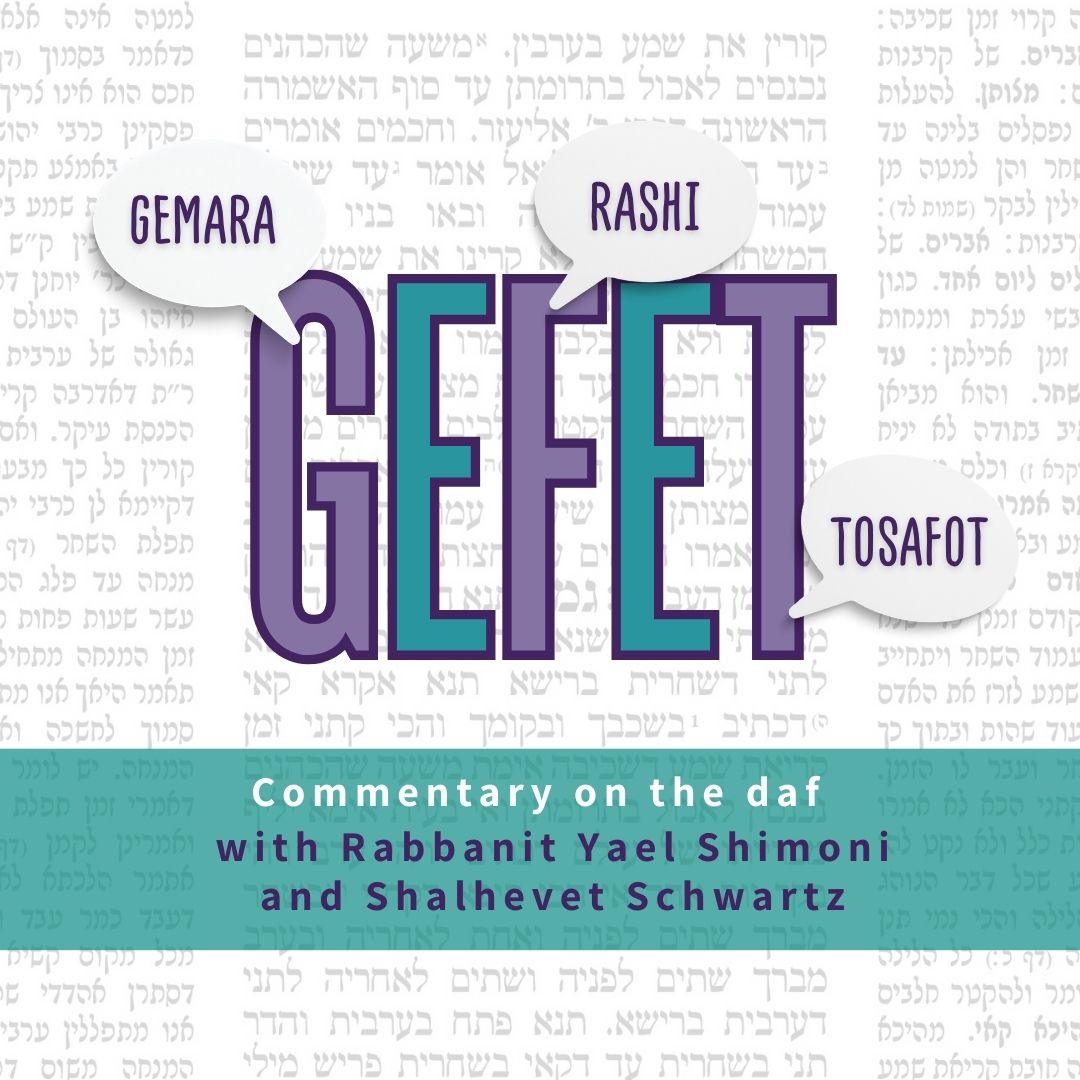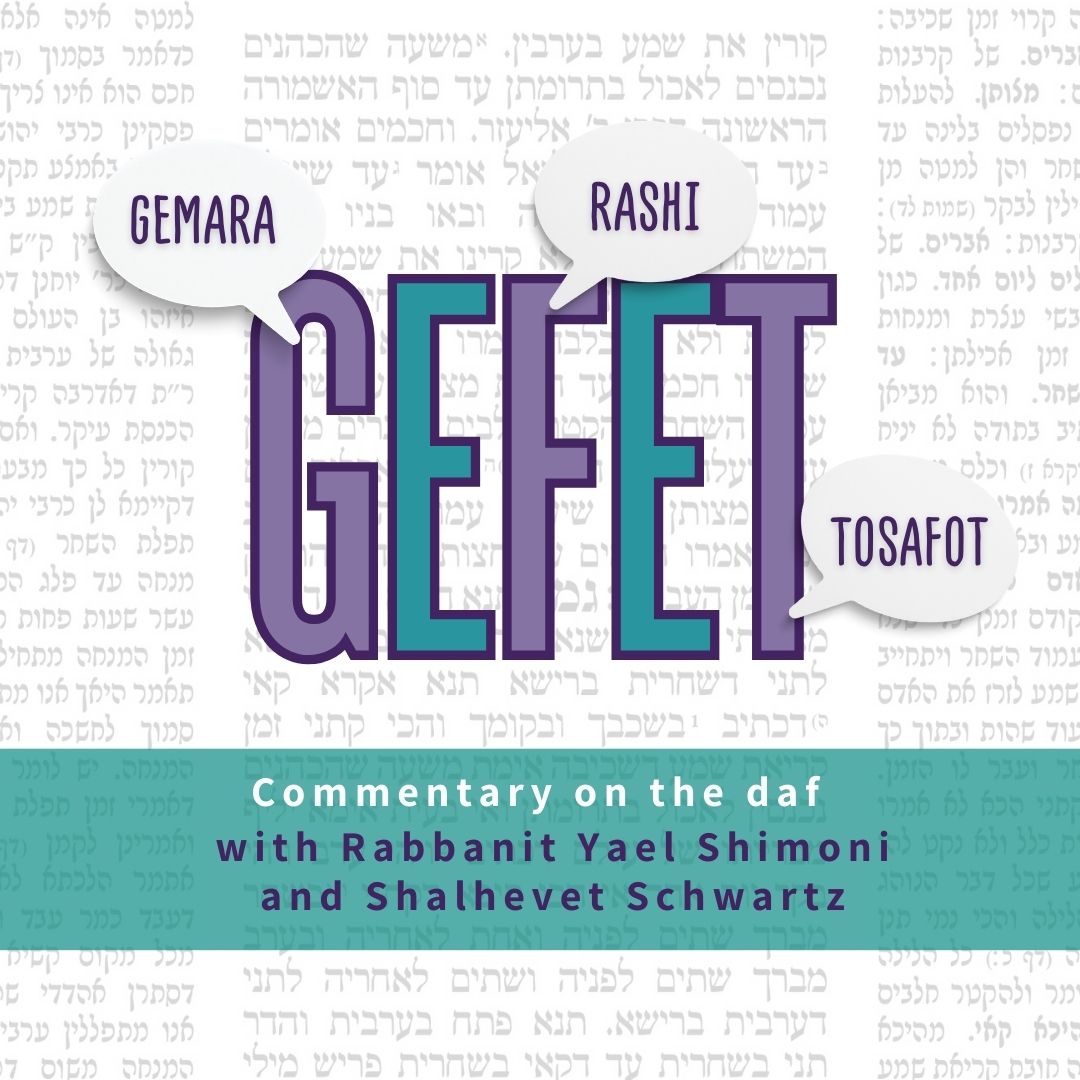The braita continues to explain extra cases where meilah is applicable – even in cases where one uses the item to purchase other sanctified items. Why did the braita need to include that a king and high priest are obligated in meilah? Does gold really not get damaged? If one benefited less than a pruta and damaged less than a pruta or benefited from one item and damaged a different, they do not join together. if one misuses a consecrated item it becomes non sacred and therefore the next person is not obligated for misuse. However there are some exceptions – which items are clear exceptions and which are a subject of debate?
This week’s learning is sponsored for the merit and safety of Haymanut (Emuna) Kasau, who was 9 years old when she disappeared from her home in Tzfat two years ago, on the 16th of Adar, 5784 (February 25, 2024), and whose whereabouts remain unknown.
This week’s learning is dedicated of the safety of our nation, the soldiers and citizens of Israel, and for the liberation of the Iranian people. May we soon see the realization of “ליהודים היתה אורה ושמחה וששון ויקר”.
This week’s learning is sponsored for the merit and safety of Haymanut (Emuna) Kasau, who was 9 years old when she disappeared from her home in Tzfat two years ago, on the 16th of Adar, 5784 (February 25, 2024), and whose whereabouts remain unknown.
Want to dedicate learning? Get started here:


Today’s daily daf tools:
This week’s learning is sponsored for the merit and safety of Haymanut (Emuna) Kasau, who was 9 years old when she disappeared from her home in Tzfat two years ago, on the 16th of Adar, 5784 (February 25, 2024), and whose whereabouts remain unknown.
This week’s learning is dedicated of the safety of our nation, the soldiers and citizens of Israel, and for the liberation of the Iranian people. May we soon see the realization of “ליהודים היתה אורה ושמחה וששון ויקר”.
This week’s learning is sponsored for the merit and safety of Haymanut (Emuna) Kasau, who was 9 years old when she disappeared from her home in Tzfat two years ago, on the 16th of Adar, 5784 (February 25, 2024), and whose whereabouts remain unknown.
Today’s daily daf tools:
Delve Deeper
Broaden your understanding of the topics on this daf with classes and podcasts from top women Talmud scholars.
New to Talmud?
Check out our resources designed to help you navigate a page of Talmud – and study at the pace, level and style that fits you.
The Hadran Women’s Tapestry
Meet the diverse women learning Gemara at Hadran and hear their stories.
Meilah 19
– עֵד שֶׁיֵּצֵא מִן הַקֹּדֶשׁ לַחוֹל.
a non-priest who partakes of teruma is not liable until the teruma leaves from the domain of the sacred to the domain of the non-sacred, as one who partakes of teruma becomes its owner, the same should apply to misuse.
מִן הַקֹּדֶשׁ לַקֹּדֶשׁ, כְּגוֹן: לָקַח קִינֵּי זָבִים, וְקִינֵּי זָבוֹת, וְקִינֵּי יוֹלְדוֹת,
But in fact one is also liable for misuse if he moves an item from the domain of the sacred to the domain of the sacred for another purpose, such as if he spent funds from the Temple treasury and acquired bird nests, i.e., pairs of birds, pigeons or doves, for zavim (see Leviticus 15:13–15), or the bird nests for zavot (see Leviticus 15:28–30), or the bird nests for women after childbirth (see Leviticus 12:6–8). Although the individual is using the money of the Temple treasury for a sacred purpose, nevertheless, since these obligatory offerings should be purchased with private funds, he commits misuse by deriving personal benefit from sacred funds.
וְשָׁקַל שִׁקְלוֹ, וְהֵבִיא חַטָּאתוֹ וַאֲשָׁמוֹ מִן הַהֶקְדֵּשׁ – כֵּיוָן שֶׁהוֹצִיא – מָעַל, דִּבְרֵי רַבִּי שִׁמְעוֹן. רַבִּי יְהוּדָה אוֹמֵר: עַד שֶׁיִּזְרוֹק הַדָּם. מִנַּיִן? תַּלְמוּד לוֹמַר: ״תִּמְעֹל מַעַל״ – מִכׇּל מָקוֹם.
And similarly, with regard to one who contributed his shekel, or brought his sin offering or his guilt offering from consecrated property, once he spends the funds he has committed misuse. This is the statement of Rabbi Shimon. Rabbi Yehuda says: He is not liable until the priest sprinkles the blood of the offerings, through which he achieves atonement, at which point he has derived his benefit from the consecrated property. The baraita returns to its question: From where is it derived that such use is also categorized as misuse? The verse states: “If anyone commits a misuse.” The inclusive language of the verse teaches that he is liable in any case.
אָמַר מָר: ״נֶפֶשׁ״ – אֶחָד הַיָּחִיד וְאֶחָד הַנָּשִׂיא וְאֶחָד הַמָּשׁוּחַ בַּמַּשְׁמָע. שֶׁיָּכוֹל, מַאי? פְּשִׁיטָא, ״נֶפֶשׁ״ כְּתִיב!
The Gemara analyzes the beginning of the baraita. The Master said above: The verse states: “If anyone commits a misuse” (Leviticus 5:15). All people are included in this halakha, whether the guilty person is the common individual, and whether he is the king, and whether he is the anointed High Priest. The Gemara asks: What else might one have thought? It is obvious that the king and the High Priest are included, as it is written: “Anyone.”
מַהוּ דְּתֵימָא, אָמַר רַחֲמָנָא ״וַאֲשֶׁר יִתֵּן מִמֶּנּוּ עַל זָר״, וְהַאי לָאו ״זָר״ הוּא, דְּהָא אִימְּשַׁח בְּגַוֵּויהּ, קָא מַשְׁמַע לַן.
The Gemara explains that the statement of the baraita is necessary, lest you say that these individuals are excluded from the halakha of misuse because the Merciful One states with regard to the anointing oil: “Or whosoever puts any of it upon a stranger, he shall be cut off from his people” (Exodus 30:33). And with regard to the anointing oil, this distinguished person, i.e., the High Priest or the king, is not considered a “stranger,” as he is anointed with it. Therefore, the baraita teaches us that even a High Priest and a king are included in the prohibition of misuse.
וְאַקְּשַׁהּ רַחֲמָנָא לְסוֹטָה, וְלַעֲבוֹדָה זָרָה, וְלִתְרוּמָה. לְסוֹטָה, דְּאַף עַל גַּב דְּלֹא פָּגַם, גַּבֵּי הֶקְדֵּשׁ נָמֵי, נָתְנָה טַבַּעַת בְּיָדָהּ – מָעֲלָה.
§ The Gemara summarizes the derivations with regard to the halakha of misuse. The Merciful One compared the halakha of misuse to the case of a sota, and to idol worship, and to teruma, in order to teach several basic principles. Misuse is compared to a sota, in the verse: “If any man’s wife goes aside, and acts unfaithfully against him” (Numbers 5:12), as here one is liable for committing adultery even though the adulteress did not damage her body through her actions. With regard to consecrated property as well, even without causing damage, as in the case in which a woman placed a consecrated gold ring on her hand, i.e., her finger, she has thereby become liable for misuse.
כִּי אַקְּשַׁהּ רַחֲמָנָא לַעֲבוֹדָה זָרָה, דְּעַד דְּאִית בַּהּ שִׁינּוּי, גַּבֵּי הֶקְדֵּשׁ נָמֵי, עַד דְּבִיקַּע בְּקַרְדּוֹם, וְיִפְגֹּם וּפָגוּם.
When the Merciful One compared misuse to idol worship, in the verse: “And they broke faith with the God of their fathers” (I Chronicles 5:25), this teaches that one is not liable for idol worship until there is a change effected by his act, as the idolater changes his worship of God for worship of idols. With regard to consecrated property as well, if the item is susceptible to damage, a person does not become liable for misuse until the act of misuse changes the item from being available for use for sacred purposes to being available for use only for non-sacred purposes, as in a case where he chops non-sacred wood with a consecrated ax and concurrently damages the ax, as the consecrated property is thereby damaged.
אַקְּשַׁהּ רַחֲמָנָא לִתְרוּמָה: מָה תְּרוּמָה, ״כִּי יֹאכַל״ – פְּרָט לְמַזִּיק, גַּבֵּי הֶקְדֵּשׁ נָמֵי – כֹּל דְּבַר אֲכִילָה, כִּי מַזֵּיק לֵיהּ – פָּטוּר.
Finally, the Merciful One compared misuse to the partaking of teruma by a non-priest, through the verbal analogy of the words “sin” and “sin” (see 18b). What is the halakha with regard to teruma? The verse states: “And if a man eats of the sacred item through error, then he shall add its fifth part upon it” (Leviticus 22:14). This excludes one who causes damage to the teruma without partaking of it, e.g., by spilling it on the ground. Such a person is exempt from the payment of the additional one-fifth. With regard to consecrated property as well, in the case of any consecrated edible item, or some other item, when one damages it without deriving benefit from the damaging act, he is exempt with regard to misuse.
כֵּיצַד? נָתְנָה קַטְלָא כּוּ׳. אֲמַר לֵיהּ רַב כָּהֲנָא לְרַב זְבִיד: וְדַהֲבָא לָאו בַּר אִיפְּגוֹמֵי הוּא? וְהָא דַּהֲבָא דְּכַלְּתֵיהּ דְּנוּן, לְהֵיכָא אֲזַל?
§ The mishna teaches: How is one liable for misuse of an item that is not subject to damage? For example, if a woman placed a consecrated gold chain around her neck. Rav Kahana said to Rav Zevid: And is it correct that gold is not subject to damage? But where did the gold of the daughter-in-law of the wealthy man Nun go? When Nun married off his son, he gave the bride many golden items of jewelry, which deteriorated over time. Evidently, gold is also subject to damage.
אֲמַר לֵיהּ: דִּלְמָא, דַּהֲבָא דְּרָמְיָין כַּלָּתָיךְ הוּא. וְעוֹד: נְהִי דְּלָא אִיכָּא נֶהֱנָה וּפָגַם לְאַלְתַּר, לְעוֹלָם מִי לָא אִיכָּא פְּגִימָה?
Rav Zevid said to Rav Kahana: Perhaps the gold of Nun’s daughter-in-law suffered the fate of the gold that your daughters-in-law cast aside. Like your daughters-in-law, Nun’s daughter-in-law treated her gold carelessly, which is why it deteriorated. And furthermore, granted that gold does not have the status of an item that is damaged immediately [le’altar] when someone derives benefit from it, but even so, does gold never sustain damage? Even gold deteriorates slowly and suffers measurable damage over long periods of time.
הַנֶּהֱנֶה מִן הַחַטָּאת וְכוּ׳. מִכְּדֵי אִי בִּבְהֵמָה תְּמִימָה, הַיְינוּ כּוֹס שֶׁל זָהָב! אָמַר רַב פָּפָּא: בְּבַעֲלַת מוּם עָסְקִינַן.
§ The mishna further teaches: One who derives benefit from a sin offering or from other items of the most sacred order, as in the case of one who detaches its wool while the animal is alive, is not liable for misuse unless he causes damage of the value of one peruta. The Gemara asks: Now, if the ruling of the mishna is stated with regard to an unblemished domesticated animal, which is fit for sacrifice, this case is the same as that of a consecrated gold cup, which is not subject to damage. Since the animal remains fit as an offering even after wool has been detached from it, why is it subject to misuse only if it is damaged? Rav Pappa said: We are dealing with a blemished animal. Since it is unfit for sacrifice, it will be sold by the Temple treasury, and therefore the removal of wool reduces its sale price. Consequently, it is subject to misuse only if such use causes it damage.
מַתְנִי׳ נֶהֱנָה כְּבַחֲצִי פְרוּטָה וּפָגַם כַּחֲצִי פְרוּטָה, אוֹ שֶׁנֶּהֱנָה בְּשָׁוֶה פְּרוּטָה בְּדָבָר אֶחָד וּפָגַם בְּשָׁוֶה פְּרוּטָה בְּדָבָר אַחֵר – לֹא מָעַל, עֵד שֶׁיֵּהָנֶה בְּשָׁוֶה פְּרוּטָה וְיִפְגֹּם בְּשָׁוֶה פְּרוּטָה בְּדָבָר אֶחָד.
MISHNA: If one derived benefit equal to half of a peruta from a consecrated item and caused it half of a peruta of damage, or if he derived benefit equal to the value of one peruta from a consecrated item that has the potential to be damaged and caused damage of the value of one peruta to another consecrated item but derived no benefit from it, he is exempt. The reason is that one is not liable for misuse until he derives benefit of the value of one peruta from a consecrated item and causes damage of the value of one peruta to one, i.e., the same item.
אֵין מוֹעֵל אַחַר מוֹעֵל בְּמוּקְדָּשִׁין אֶלָּא בְּהֵמָה וּכְלִי שָׁרֵת בִּלְבַד. כֵּיצַד? רָכַב עַל גַּבֵּי בְּהֵמָה, וּבָא חֲבֵרוֹ וְרָכַב, וּבָא חֲבֵרוֹ וְרָכַב – כּוּלָּן מָעֲלוּ. שָׁתָה בְּכוֹס שֶׁל זָהָב, וּבָא חֲבֵרוֹ וְשָׁתָה, וּבָא חֲבֵרוֹ וְשָׁתָה – כּוּלָּן מָעֲלוּ. תָּלַשׁ מִן הַחַטָּאת, וּבָא חֲבֵרוֹ וְתָלַשׁ, וּבָא חֲבֵרוֹ וְתָלַשׁ – כּוּלָּן מָעֲלוּ. רַבִּי אוֹמֵר: כׇּל דָּבָר שֶׁאֵין לוֹ פִּדְיוֹן – יֵשׁ בּוֹ מוֹעֵל אַחַר מוֹעֵל.
One is liable for misuse after misuse in consecrated items only in the case of an animal and in the case of service vessels.How so? If one rode upon a sacrificial animal, and another person came and rode upon that animal, and yet another came and rode upon it as well, all of them are liable for misuse of the animal. In the case of service vessels, if one drank from a gold cup, and another came and drank from that cup, and yet another individual came and drank from it, all of them are liable for misuse of the cup. If one removed wool from a sin offering, and another came and removed wool from that animal, and yet another person came and removed wool from it, all of them are liable for misuse of the animal. Rabbi Yehuda HaNasi says: With regard to any consecrated item that is not subject to redemption, there is liability for misuse after misuse with regard to it.
גְּמָ׳ מַנִּי? מַתְנִיתִין רַבִּי נְחֶמְיָה, הִיא: דְּתַנְיָא אֵין מוֹעֵל אַחַר מוֹעֵל אֶלָּא בִּבְהֵמָה בִּלְבַד. רַבִּי נְחֶמְיָה אוֹמֵר: בְּהֵמָה וּכְלִי שָׁרֵת.
GEMARA: According to the mishna, one can be liable for misuse after misuse only in the case of an animal or service vessels. The Gemara inquires: Whose opinion is expressed in the mishna? It is the opinion of Rabbi Neḥemya, as it is taught in a baraita (Tosefta 2:6): One is liable for misuse after misuse only in the case of an animal alone. Since an animal designated for sacrifice is not awaiting redemption or sale, its sanctity is not compromised when someone misuses it. It is therefore susceptible to repeated misuse. But with regard to service vessels, as according to the first tanna of the baraita they may be redeemed, their sanctity is compromised after they are misused even once, and they are no longer subject to misuse. Rabbi Neḥemya says: One is liable for misuse both in the case of an animal and in the case of service vessels.
מַאי טַעְמָא דְּתַנָּא קַמָּא? קָסָבַר: בְּעִנְיָינָא דִבְהֵמָה כְּתִיב, דִּכְתִיב בְּאֵיל הָאָשָׁם.
The Gemara asks: What is the reason of the first tanna in the baraita, who rules that service vessels are not susceptible to repeated misuse? The Gemara answers that he holds that the halakha of misuse is written with regard to the case of an animal. As it is written: “If anyone commits a misuse, and sins through error, in the sacred items of the Lord, then he shall bring his guilt offering to the Lord…and the priest shall make atonement for him with the ram of the guilt offering, and he shall be forgiven” (Leviticus 5:15–16). It is derived from here that the liability for repeated misuse applies only to an animal.
וְרַבִּי נְחֶמְיָה, אָמַר לָךְ: קַל וָחוֹמֶר: אִם אֲחֵרִים מֵבִיא לִקְדוּשָּׁתָן, הוּא עַצְמוֹ – לֹא כׇּל שֶׁכֵּן!
And Rabbi Neḥemya could have said to you, in response, the following a fortiori inference: If a service vessel brings other materials placed in them to their state of sanctity, thereby rendering those materials susceptible to misuse after misuse, all the more so is it not clear that the vessel itself should be susceptible to misuse after misuse.
רַבִּי אוֹמֵר: כׇּל דָּבָר שֶׁאֵין לוֹ פִּדְיוֹן, יֵשׁ כּוּ׳. הַיְינוּ תַּנָּא קַמָּא! אָמַר רָבָא: אִיכָּא בֵּינַיְיהוּ עֵצִים.
§ The mishna teaches that Rabbi Yehuda HaNasi says: With regard to any consecrated item that is not subject to redemption, there is liability for misuse after misuse. The Gemara raises a difficulty: This opinion is the same as that of the first tanna. Why is this ruling presented as a dissenting opinion? Rava said: There is a difference between them in the case of donated wood. The first tanna maintains that wood does not have the status of an item consecrated as an offering; rather, it has the status of an item consecrated for Temple maintenance, and is therefore not subject to repeated misuse. By contrast, Rabbi Yehuda HaNasi holds that wood has the status of items consecrated as an offering, which is not subject to damage and is therefore subject to repeated misuse.
דְּתָנוּ רַבָּנַן: הָאוֹמֵר ״הֲרֵי עָלַי עֵצִים״ – לֹא יִפְחוֹת מִשְּׁנֵי גְזִירִין. רַבִּי אוֹמֵר: עֵצִים – קׇרְבָּן הֵן, וּטְעוּנִין מֶלַח, וּטְעוּנִין תְּנוּפָה.
As the Sages taught in a baraita: With regard to one who says, in the form of a vow: It is incumbent upon me to bring wood to the Temple, he must not bring fewer than two logs for the arrangement on the altar. Rabbi Yehuda HaNasi says: Wood is considered an offering, as it is placed upon the altar, and therefore it requires salt, and it requires waving, like a meal offering.
אָמַר רָבָא: לְדִבְרֵי רַבִּי, עֵצִים טְעוּנִין עֵצִים. וְאָמַר רַב פָּפָּא: לְדִבְרֵי רַבִּי, עֵצִים צְרִיכִין קְמִיצָה.
Rava says: According to the statement of Rabbi Yehuda HaNasi, wood donated in this manner requires more wood as an accompaniment, so that the donated sacrificial wood is sacrificed in the same manner as other donated offerings. And Rav Pappa further says: According to the statement of Rabbi Yehuda HaNasi, wood donated in this manner requires the removal of a handful. Similar to the rite of a meal offering, a portion of the wood must be removed and burned first.
רַב פָּפָּא אָמַר: קׇדְשֵׁי מִזְבֵּחַ תְּמִימִין וְנַעֲשׂוּ בַּעֲלֵי מוּמִין וְעָבַר וּשְׁחָטָן אִיכָּא בֵּינַיְיהוּ.
Rav Pappa said that there is another difference between the opinion of the first tanna and that of Rabbi Yehuda HaNasi. If there were unblemished animals consecrated for the altar, and they became blemished and were disqualified from being sacrificed as offerings, and someone transgressed and slaughtered them before they were redeemed, in this case there is a difference between the opinion of the first tanna and that of Rabbi Yehuda HaNasi.
וְהָתַנְיָא: קׇדְשֵׁי מִזְבֵּחַ תְּמִימִין, וְנַעֲשׂוּ בַּעֲלֵי מוּמִין, וְעָבַר וּשְׁחָטָן, רַבִּי אוֹמֵר: יִקָּבְרוּ,
And indeed, it is taught in a baraita that Rabbi Yehuda HaNasi and the Rabbis engage in a dispute in that case: If there were unblemished animals consecrated for the altar, and they became blemished, and someone transgressed and slaughtered them, Rabbi Yehuda HaNasi says: The consecrated animals may no longer be redeemed, as it is written: “He shall stand the animal before the priest. And the priest shall value it” (Leviticus 27:11–12). A dead animal cannot be stood before the priest, and therefore the animal carcasses must be buried.
וַחֲכָמִים אוֹמְרִים: יִפָּדוּ.
But the Rabbis say: The animals should be redeemed. Since Rabbi Yehuda HaNasi maintains the animals may not be redeemed, this indicates that they have inherent sanctity, and therefore they are subject to repeated misuse. By contrast, the first tanna, like the Rabbis, holds that their sanctity is a function of their value, and consequently they are not subject to repeated misuse.
מַתְנִי׳ נָטַל אֶבֶן אוֹ קוֹרָה שֶׁל הֶקְדֵּשׁ – הֲרֵי זֶה לֹא מָעַל.
MISHNA: In a case where one took for his use a consecrated stone or a beam, that person is not liable for its misuse.








































